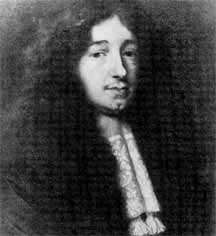Christian Huygens 
(1629 - 1695 AD) Dutch physicist who was the leading proponent of the wave theory of light. In Trait� de la Lumin�re (1690), he developed the concept of the wavefront, but could not explain color. The wave theory, however, was supported by the observation that two intersecting beams of light did not bounce off each other as would be expected if they were composed of particles. In contradiction to Newton, Huygens correctly believed that light must travel more slowly when it is refracted towards the normal, although this was not proven until experiments by Foucault in the nineteenth century. Huygens also made important contributions to mechanics, stating that in a collision between bodies, neither loses nor gains "motion" (his term for momentum). He stated that the center of gravity moves uniformly in a straight line, and gave the expression for centrifugal force as F = (mv2)/r. Additionally, he studied pendula. He discovered Titan and was the first to correctly identify the observed elongation of Saturn as the presence of Saturn's rings. Huygens was also the mentor of Leibniz in math and mechanics. **The preceding information is provided by the Eric Weisstein's World of Scientific Biogra.** |